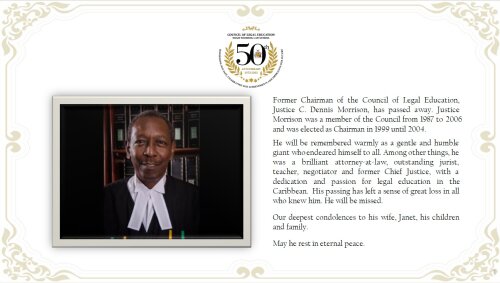Best Marine Insurance Lawyers in Trinidad and Tobago
Share your needs with us, get contacted by law firms.
Free. Takes 2 min.
Or refine your search by selecting a city:
List of the best lawyers in Trinidad and Tobago
About Marine Insurance Law in Trinidad and Tobago
Marine insurance in Trinidad and Tobago is governed by principles derived from English common law and supplemented by local regulations. This type of insurance provides coverage for the loss or damage of ships, cargo, terminals, and any transport in which the goods are transferred between points of origin and final destination. Given the country's strategic maritime location, marine insurance plays a critical role in supporting its trade and shipping industries.
Why You May Need a Lawyer
Engaging a lawyer experienced in marine insurance can be crucial for several reasons. Whether dealing with disputes regarding policy interpretation, claims of loss or damage, issues with contract terms, or liability questions, legal guidance can help navigate these complex matters. A lawyer can also provide assistance in drafting and reviewing insurance policies to ensure they meet statutory requirements and your specific needs.
Local Laws Overview
The legal landscape for marine insurance in Trinidad and Tobago is shaped by both statutory provisions and case law reflecting international maritime principles. Key aspects include the Marine Insurance Act, which aligns closely with its UK counterpart, and regulations pertaining to liability, such as the liability of ship owners. Familiarity with these laws ensures compliance and effective handling of any marine insurance issues that may arise.
Frequently Asked Questions
What is marine insurance?
Marine insurance is a type of insurance designed to cover the loss or damage associated with marine ventures, including shipping, cargo, and vessels.
Is marine insurance mandatory in Trinidad and Tobago?
While not universally mandatory, marine insurance is typically required by shipping agreements and lenders to protect against financial loss.
How do I determine the coverage I need for my vessel?
The necessary coverage depends on factors such as the type of vessel, cargo being transported, and routes. Consulting a maritime insurance expert is recommended.
What common risks are covered under marine insurance?
Most policies cover risks like theft, piracy, collision, natural disasters, and other perils specific to maritime environments.
How are claims processed in marine insurance?
Claims processing involves notifying your insurer, providing detailed documentation of the loss or damage, and cooperating with any investigation. A lawyer can help facilitate this process.
What can I do if my claim is denied?
If a claim is denied, reviewing the policy terms and seeking legal advice is crucial to addressing potential issues or disputes with the insurer.
Can I insure cargo against delay?
Most standard marine insurance policies do not cover losses due to delay unless specifically included. Specialized coverage is available for such scenarios.
How are insurance premiums determined?
Premiums are calculated based on factors like the value of the vessel or cargo, routes traveled, and the owner's loss history, among others.
Is damage during loading and unloading covered?
Coverage often extends to include risks during loading and unloading, but it is important to confirm these details with your insurance provider.
What steps should I take if I experience a loss?
Immediately report the incident to your insurer, gather evidence (photographs, reports), and keep records. Consult a maritime lawyer for assistance in filing and supporting your claim.
Additional Resources
For more information, consider reaching out to the Trinidad and Tobago Insurance Institute, the local Chamber of Commerce, or the Maritime Authority of Trinidad and Tobago. These organizations can provide valuable insights and connections to industry professionals.
Next Steps
If you require legal assistance with marine insurance, begin by compiling all relevant documentation related to your policy and any incidents or claims. Contacting a lawyer who specializes in marine insurance law will provide guidance tailored to your individual situation. They can offer advice, represent you in disputes, and ensure that your legal rights are protected throughout the process.
Lawzana helps you find the best lawyers and law firms in Trinidad and Tobago through a curated and pre-screened list of qualified legal professionals. Our platform offers rankings and detailed profiles of attorneys and law firms, allowing you to compare based on practice areas, including Marine Insurance, experience, and client feedback.
Each profile includes a description of the firm's areas of practice, client reviews, team members and partners, year of establishment, spoken languages, office locations, contact information, social media presence, and any published articles or resources. Most firms on our platform speak English and are experienced in both local and international legal matters.
Get a quote from top-rated law firms in Trinidad and Tobago — quickly, securely, and without unnecessary hassle.
Disclaimer:
The information provided on this page is for general informational purposes only and does not constitute legal advice. While we strive to ensure the accuracy and relevance of the content, legal information may change over time, and interpretations of the law can vary. You should always consult with a qualified legal professional for advice specific to your situation.
We disclaim all liability for actions taken or not taken based on the content of this page. If you believe any information is incorrect or outdated, please contact us, and we will review and update it where appropriate.
Browse marine insurance law firms by city in Trinidad and Tobago
Refine your search by selecting a city.










